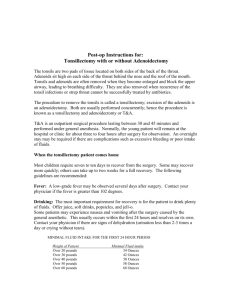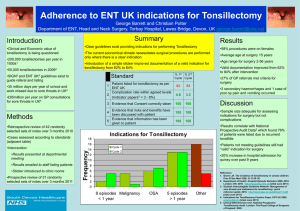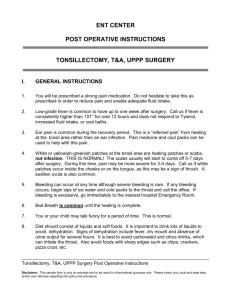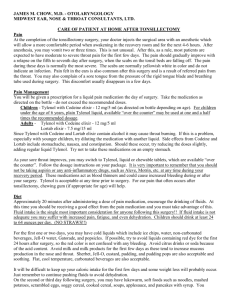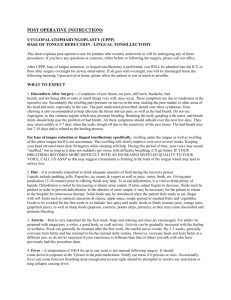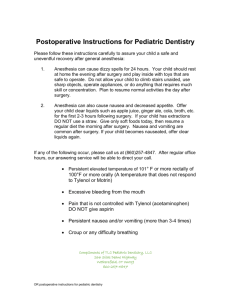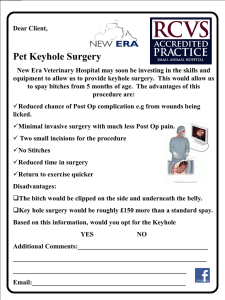Tonsillectomy & Adenoidectomy Post-Op Instructions
advertisement
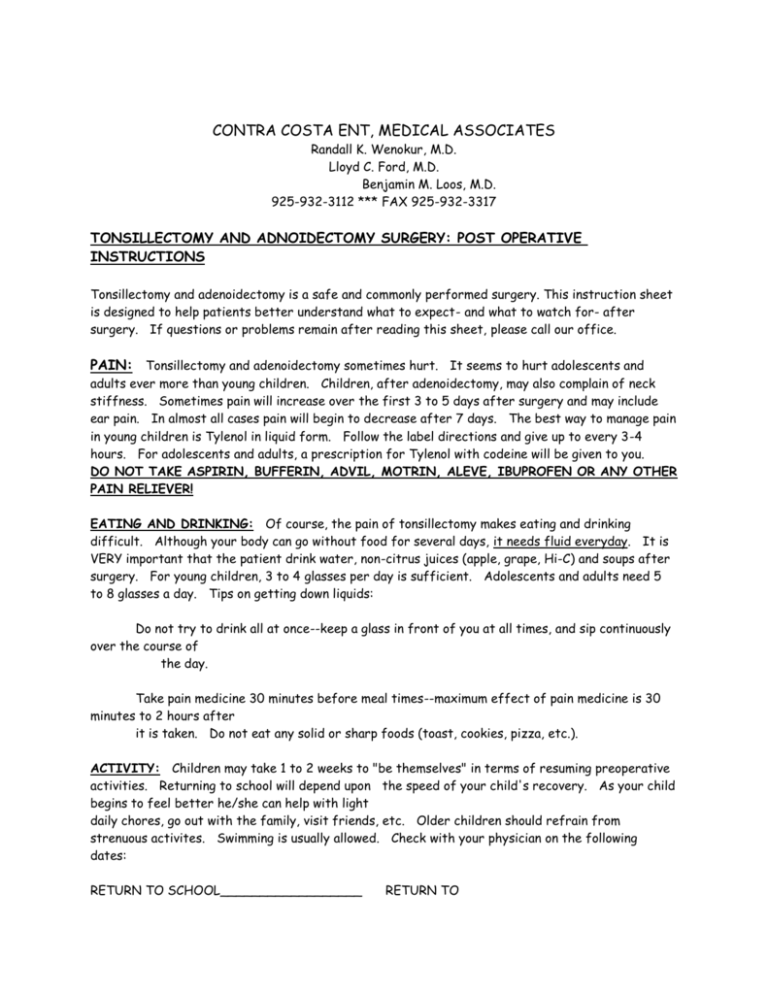
CONTRA COSTA ENT, MEDICAL ASSOCIATES Randall K. Wenokur, M.D. Lloyd C. Ford, M.D. Benjamin M. Loos, M.D. 925-932-3112 *** FAX 925-932-3317 TONSILLECTOMY AND ADNOIDECTOMY SURGERY: POST OPERATIVE INSTRUCTIONS Tonsillectomy and adenoidectomy is a safe and commonly performed surgery. This instruction sheet is designed to help patients better understand what to expect- and what to watch for- after surgery. If questions or problems remain after reading this sheet, please call our office. PAIN: Tonsillectomy and adenoidectomy sometimes hurt. It seems to hurt adolescents and adults ever more than young children. Children, after adenoidectomy, may also complain of neck stiffness. Sometimes pain will increase over the first 3 to 5 days after surgery and may include ear pain. In almost all cases pain will begin to decrease after 7 days. The best way to manage pain in young children is Tylenol in liquid form. Follow the label directions and give up to every 3-4 hours. For adolescents and adults, a prescription for Tylenol with codeine will be given to you. DO NOT TAKE ASPIRIN, BUFFERIN, ADVIL, MOTRIN, ALEVE, IBUPROFEN OR ANY OTHER PAIN RELIEVER! EATING AND DRINKING: Of course, the pain of tonsillectomy makes eating and drinking difficult. Although your body can go without food for several days, it needs fluid everyday. It is VERY important that the patient drink water, non-citrus juices (apple, grape, Hi-C) and soups after surgery. For young children, 3 to 4 glasses per day is sufficient. Adolescents and adults need 5 to 8 glasses a day. Tips on getting down liquids: Do not try to drink all at once--keep a glass in front of you at all times, and sip continuously over the course of the day. Take pain medicine 30 minutes before meal times--maximum effect of pain medicine is 30 minutes to 2 hours after it is taken. Do not eat any solid or sharp foods (toast, cookies, pizza, etc.). ACTIVITY: Children may take 1 to 2 weeks to "be themselves" in terms of resuming preoperative activities. Returning to school will depend upon the speed of your child's recovery. As your child begins to feel better he/she can help with light daily chores, go out with the family, visit friends, etc. Older children should refrain from strenuous activites. Swimming is usually allowed. Check with your physician on the following dates: RETURN TO SCHOOL__________________ RETURN TO GYM/SPORTS_________________________ FEVER & INFECTION: Fever up to 101 degrees after tonsillectomy is very common--treat it with Tylenol and fluids. Infection after tonsillectomy is very uncommon. You will be given a prescription for antibiotic liquid to take. OTHER SYMPTOMS TO EXPECT: It is normal to have mild bad breath or snoring for the first week after surgery. The tonsil areas will look very abnormal--do not be surprised by this (it will turn white). BLEEDING: Bleeding is the major risk of tonsillectomy. It can occur as early as the night of surgery, or as late as 10 days or more after surgery. Bleeding is unusual--it occurs in 3 out of evey 100 patients. Because bleeding can be very brisk, or sudden, all cases of bleeding after tonsillectomy should be discussed with a doctor. For this reason, it is very important that for 2 weeks after surgery you remain comfortable driving distance of the hospital. Do not plan any trips away, or leave the patient alone. If a patient bleeds, please call the number listed at the top of this page. THIS IS VERY IMPORTANT! REMEMBER: Your body is undergoing a gradual healing process. Soon you will be feeling better than ever!
